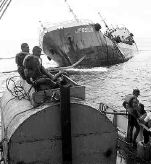![]()
Oil spill threatens Galapagos wildlife
Rare species at risk:
Ecuadoran tanker runs aground near San Cristobal Island
Jeremy McDermott
The Daily Telegraph, with files from Agence France-Presse
NATIONAL POST - January 22, 2001
MEDELLIN, Colombia - Ecuadoran officials, assisted by the U.S. Coast Guard, were struggling to stave off an environmental disaster in the Galapagos Islands yesterday after a capsized tanker spilled more than half its cargo of of 1.1 million litres of oil into the archipelago's pristine waters.
| The islands, whose fragile
ecosystem inspired Darwin's theory of evolution,
are threatened by an oil spill from the Ecuadoran-registered
Jessica, which ran aground Tuesday near the
island of San Cristobal. Admiral Gonzalo Vega, director of Ecuador's Merchant Marine, said about 655,000 litres of oil have spilled into the sea. Anywhere up to 436,000 litres of fuel remain aboard the ship, which was delivering the oil to the Ecuadoran navy and a private tour boat operator. A sheet of oil began spreading around the ship, lying some 800 metres offshore, after it sprung a leak. "The currents are taking the oil to the south, where one of the largest seal colonies on the archipelago is situated," said Rodolfo Rendon, Ecuador's Environment Minister. |
Dolores Ochoa,
The Associated Press |
The Ecuadoran navy has been trying to contain the disaster with a makeshift fence around the worst area of the spill while sailors unload the remaining fuel.
But the arrival yesterday of the U.S. Coast Guard's pollution response team has offered the first hope that the slick may be kept away from the delicate and isolated Galapagos ecosystem.
The 10-member Coast Guard team left Mobile, Ala., on Saturday in a Hercules aircraft loaded with pumping equipment and inflatable barges, which will be used to haul the oil away.
However, there are fears stormy weather forecast for today could hinder the operation and spread the spill over a much wider area.
Marine life has already been affected, said Elicier Cruz, director of Galapagos National Park. Seals, sea lions, marine iguanas, birds, sharks and lobsters have come into contact with the fuel, he said.
The Galapagos, a chain of 13 islands 1,000 kilometres off the coast of Ecuador, were visited by British naturalist Charles Darwin in 1835 and inspired his theory of evolution based on natural selection.
His theory appeared in his ground-breaking book of 1859, On the Origin of Species.
In 1959, 97% of the land area of the islands was declared a national park by the government of Ecuador.
Due to the isolation of the islands and the creation of the Galapagos National Park, the wildlife, much of which cannot be found anywhere else on Earth, has been allowed to develop unmolested by human intervention.
One of the world's most endangered species, the giant tortoise, lives on the Galapagos Islands. The huge, slow-moving creatures are particularly vulnerable to the oil slick.
Conservationists estimate there are less than 800 still in existence. Giant tortoises can live up to 150 years, -- one of the longest lifespans of any creature on the planet.
The islands are the primary tourist attraction for Ecuador and the number of visitors is limited, although last year there were some 60,000 as the cash-strapped country collected much-needed revenue.
Environmentalists claim the tourist industry is damaging the islands' fragile ecosystem.
NATIONAL POST - January 22, 2001
